| Listing 1 - 9 of 9 |
Sort by
|
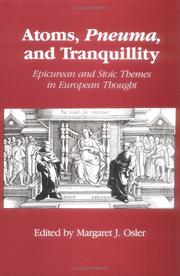
ISBN: 0521400481 9780521400480 9780511608353 9780521018463 Year: 1991 Publisher: Cambridge: Cambridge university press,
Abstract | Keywords | Export | Availability | Bookmark
 Loading...
Loading...Choose an application
- Reference Manager
- EndNote
- RefWorks (Direct export to RefWorks)
Ancient philosophy --- Antieke filosofie --- Filosofie [Antieke ] --- Filosofie [Griekse ] --- Filosofie [Middeleeuwse ] --- Filosofie [Moderne ] --- Filosofie [Romeinse ] --- Filosofie van de Oudheid --- Greek philosophy --- Griekse filosofie --- Medieval philosophy --- Middeleeuwse filosofie --- Philosophes du Portique --- Philosophes stoïciens --- Philosophie ancienne --- Philosophie antique --- Philosophie de l'Antiquité --- Philosophie du Portique --- Philosophie grecque --- Philosophie moderne --- Philosophie médiévale --- Philosophie romaine --- Philosophie stoïcienne --- Philosophy [Ancient ] --- Philosophy [Greek ] --- Philosophy [Medieval ] --- Philosophy [Modern ] --- Philosophy [Roman ] --- Portique (Philosophie grecque) --- Portique [Le ] (Ecole philosophique ancienne) --- Roman philosophy --- Romeinse filosofie --- Stoa (Filosofische school) --- Stoicism --- Stoics --- Stoïciens --- Stoïcijnen --- Stoïcisme --- Stoïcisme (Philosophie grecque) --- École du Portique --- École stoïcienne --- Philosophy, Ancient --- Philosophy, Medieval --- Philosophy, Modern --- Epicurus --- Influence --- Stoics. --- Philosophy, Ancient. --- Philosophy, Medieval. --- Philosophy, Modern. --- Influence. --- Ethics --- Modern philosophy --- Scholasticism --- Philosophy, Greek --- Philosophy, Roman --- -Epikuros --- Ėpikur --- Epiḳoros --- Epicuro --- Epikouros --- Abīqūr --- Yibijiulu --- Epicure --- Epʻikʻurosŭ --- Έπίκουρος --- -Influence --- Philosophie médiévale --- Stoïcisme --- Epicurus - Influence. --- Ἐπίκουρος --- Epikuros
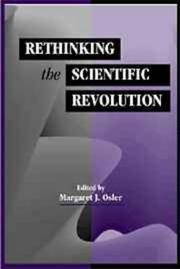
ISBN: 0521667909 0521661013 0511529279 Year: 2000 Publisher: Cambridge : Cambridge university press,
Abstract | Keywords | Export | Availability | Bookmark
 Loading...
Loading...Choose an application
- Reference Manager
- EndNote
- RefWorks (Direct export to RefWorks)
This book challenges the traditional historiography of the Scientific Revolution, probably the single most important unifying concept in the history of science. Usually referring to the period from Copernicus to Newton (roughly 1500 to 1700), the Scientific Revolution is considered to be the central episode in the history of science, the historical moment at which that unique way of looking at the world that we call 'modern science' and its attendant institutions emerged. It has been taken as the terminus a quo of all that followed. Starting with a dialogue between Betty Jo Teeter Dobbs and Richard S. Westfall, whose understanding of the Scientific Revolution differed in important ways, the papers in this volume reconsider canonical figures, their areas of study, and the formation of disciplinary boundaries during this seminal period of European intellectual history.
Science [Renaissance ] --- Science de la Renaissance --- Wetenschap [Renaissance-] --- Science, Renaissance. --- Science --- Sciences de la Renaissance --- Sciences --- History --- Histoire --- Science, Renaissance --- Natural science --- Science of science --- Renaissance science --- England --- 17th century --- France --- Natural sciences --- Arts and Humanities
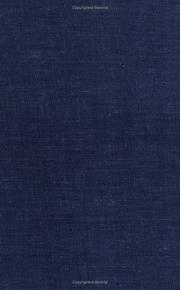
ISBN: 0521461049 052152492X 9780521524926 9780521461047 9780511529269 0511529260 Year: 1994 Publisher: Cambridge : Cambridge university press,
Abstract | Keywords | Export | Availability | Bookmark
 Loading...
Loading...Choose an application
- Reference Manager
- EndNote
- RefWorks (Direct export to RefWorks)
This book is about the influence of varying theological conceptions of contingency and necessity on two versions of the mechanical philosophy in the seventeenth century. Pierre Gassendi (1592-1655) and René Descartes (1596-1650) both believed that all natural phenomena could be explained in terms of matter and motion alone. They disagreed about the details of their mechanical accounts of the world, in particular about their theories of matter and their approaches to scientific method. This book traces their differences back to theological presuppositions they inherited from the Middle Ages. Theological ideas were transformed into philosophical and scientific ideas which led to the emergence of different styles of science in the second half of the seventeenth century.
Contingency (Philosophy) --- Free will and determinism --- God --- Necessity (Philosophy) --- Philosophy of nature --- Providence and government of God --- Science --- Causation --- Chance --- Fate and fatalism --- Ontology --- Teleology --- Truth --- Philosophy --- Nature --- Nature, Philosophy of --- Natural theology --- Metaphysics --- Misotheism --- Monotheism --- Religion --- Theism --- Compatibilism --- Determinism and free will --- Determinism and indeterminism --- Free agency --- Freedom and determinism --- Freedom of the will --- Indeterminism --- Liberty of the will --- Determinism (Philosophy) --- History --- Will --- History of doctrines --- Providence and government --- Sovereignty --- Descartes, René, --- Gassendi, Pierre, --- Gassendi, Pierre --- Gassendi, Petrus --- Gassendus, Petrus --- Descartes, Renatus --- Cartesius, Renatus --- Descartes, René --- Descartes, René, --- Contingency (Philosophy). --- Necessity (Philosophy). --- Mechanism (Philosophy) --- Dieu --- Providence divine --- Contingence (Philosophie) --- Nécessité (Philosophie) --- Mécanisme (Philosophie) --- Sciences --- Philosophie de la nature --- Volonté --- Histoire des doctrines --- Histoire --- Philosophie --- Contributions in mechanical philosophy. --- Gassendus, Petrus, --- Petrus Gassendus, --- Gassend, Pierre, --- Arts and Humanities --- God - Will - History of doctrines - 17th century. --- Providence and government of God - History of doctrines - 17th century. --- Free will and determinism - History - 17th century. --- Science - Philosophy - History - 17th century. --- Philosophy of nature - History - 17th century. --- Gassendi, Pierre, - 1592-1655. --- Descartes, René, - 1596-1650. --- Critique et interprétation --- Gassendi, Pierre (1592-1655) --- Mécanisme (philosophie) --- Libre arbitre --- Nécessité --- Contingence --- Philosophie des sciences --- 17e siècle --- Gouvernement
Book
ISBN: 9780801896552 080189655X Year: 2010 Publisher: Baltimore: Johns Hopkins University press,
Abstract | Keywords | Export | Availability | Bookmark
 Loading...
Loading...Choose an application
- Reference Manager
- EndNote
- RefWorks (Direct export to RefWorks)
Change in human understanding of the natural world during the early modern period marks one of the most important episodes in intellectual history. This era is often referred to as the scientific revolution, but recent scholarship has challenged traditional accounts. Here, in Reconfiguring the World, Margaret J. Osler treats the development of the sciences in Europe from the early sixteenth to the late seventeenth centuries as a complex and multifaceted process. The worldview embedded in modern science is a relatively recent development. Osler aims to convey a nuanced understanding of how the natural world looked to early modern thinkers such as Galileo, Descartes, Boyle, and Newton. She describes investigation and understanding of the natural world in terms that the thinkers themselves would have used. Tracing the views of the natural world to their biblical, Greek, and Arabic sources, Osler demonstrates the impact of the Renaissance recovery of ancient texts, printing, the Protestant Reformation, and the exploration of the New World. She shows how the traditional disciplinary boundaries established by Aristotle changed dramatically during this period and finds the tensions of science and religion expressed as differences between natural philosophy and theology. Far from a triumphalist account, Osler’s story includes false starts and dead ends. Ultimately, she shows how a few gifted students of nature changed the way we see ourselves and the universe.
Book
ISBN: 9780801896569 Year: 2010 Publisher: Baltimore Johns Hopkins university press
Abstract | Keywords | Export | Availability | Bookmark
 Loading...
Loading...Choose an application
- Reference Manager
- EndNote
- RefWorks (Direct export to RefWorks)
Science, Medieval --- Science --- Philosophy --- History
Book
ISBN: 0511608357 Year: 1991 Publisher: Cambridge : Cambridge University Press,
Abstract | Keywords | Export | Availability | Bookmark
 Loading...
Loading...Choose an application
- Reference Manager
- EndNote
- RefWorks (Direct export to RefWorks)
This volume examines the influence that Epicureanism and Stoicism, two philosophies of nature and human nature articulated during classical times, exerted on the development of European thought to the Enlightenment. Although the influence of these philosophies has often been noted in certain areas, such as the influence of Stoicism on the development of Christian thought and the influence of Epicureanism on modern materialism, the chapters in this volume contribute a new awareness of the degree to which these philosophies and their continued interaction informed European intellectual life well into early modern times. The influence of the Epicurean and Stoic philosophies in the areas of literature, philosophy, theology, and science are considered. Many thinkers continue to perceive these philosophies as significant alternatives for understanding the human and natural worlds. Having become incorporated into the canon of philosophical alternatives, Epicureanism and Stoicism continued to exert identifiable influences on scientific and philosophical thought at least until the middle of the eighteenth century.
Stoics. --- Philosophy, Ancient. --- Philosophy, Medieval. --- Philosophy, Modern. --- Epicurus --- Influence.
Book
Year: 1998 Publisher: Glendale, Cal. Jeff Weber Rare Books
Abstract | Keywords | Export | Availability | Bookmark
 Loading...
Loading...Choose an application
- Reference Manager
- EndNote
- RefWorks (Direct export to RefWorks)
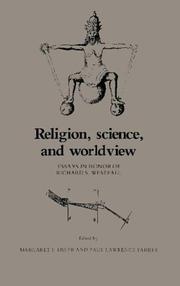
ISBN: 0521304520 Year: 1985 Publisher: Cambridge Cambridge University press
Abstract | Keywords | Export | Availability | Bookmark
 Loading...
Loading...Choose an application
- Reference Manager
- EndNote
- RefWorks (Direct export to RefWorks)
Religion and science --- Science --- History --- Social aspects --- Newton, Isaac, --- Westfall, Richard S.
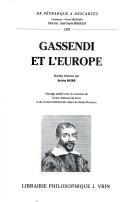

ISBN: 2345001283 2711613062 Year: 2021 Publisher: Paris : Vrin,
Abstract | Keywords | Export | Availability | Bookmark
 Loading...
Loading...Choose an application
- Reference Manager
- EndNote
- RefWorks (Direct export to RefWorks)
Difficile à lire, connu de réputation pour ses objections aux Méditations de Descartes, sa réhabilitation d’Épicure et des atomes, voire le caractère ambigu de ses relations avec les “libertins”, Pierre Gassendi est un personnage un peu flou dans notre galerie de portraits imaginaire. Il fut cependant un auteur important, lu, connu, approuvé ou critiqué dans toute l’Europe, surtout par les savants qui voulaient fonder efficacement leur physique moderne sans renier pour autant les acquis des anciens. Les études réunies ici ont cherché comme la trace et le reflet de l’œuvre de Gassendi dans les écrits d’autres auteurs qui ont vécu de son temps et jusqu’à la fin des Lumières – non seulement en France –, mais aussi en Angleterre (comme Walter Charleton, John Locke, David Hume ou Robert Boyle), en Hollande (professeurs d’Université), en Allemagne (Leibniz), en Pologne (Sociniens et “libertins”), en Italie du Nord (comme le jésuite milanais Thommaso Ceva), en Italie du Sud (comme le fondateur de l’Accademia degli Investiganti Tommaso Cornelio ou Giambattista Vico), en Espagne enfin (comme le médecin Martínez). Aujourd’hui encore Gassendi fait des adeptes parmi ceux que séduisent les chemins non battus de l’effort gratuit et de l’érudition austère, ceux que ravit absolument une certaine esthétique baroque de l’esprit pur.
History & Philosophy Of Science --- Medieval & Renaissance Studies --- Renaissance --- philosophie
| Listing 1 - 9 of 9 |
Sort by
|

 Search
Search Feedback
Feedback About UniCat
About UniCat  Help
Help News
News